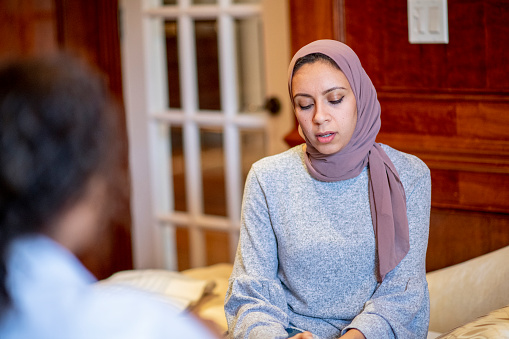
You may have heard the word ‘codependency’ before. When you first think about it, it can seem like a basic tenet of a relationship: each person depends on the other, the mutual reliance equating to a co-dependent agreement. Part of this should be true; relationships are about taking care of one another. A solid relationship is about supporting and being there for one another. At times, forgiving mistakes and moving through difficulties. A life partner is someone with whom you are likely spending the most time out of anyone. Generally, we see couples live together and make life decisions together: whether or not to have children, whether to move to another city for one person’s career opportunities, what color to paint the living room, and what to have for dinner that evening. The big decisions and the daily life choices go hand in hand in this partnership. This person inevitably becomes your default support person.
What happens when this loyalty and commitment to long-term relationships secretly reinforces people-pleasing and codependency? How can you tell the signs? How do you tell the difference between valuing your partner’s opinion and needing their approval? How do you differentiate between investment and control, compromise and sacrifice? It can be very difficult, especially because relationships evolve over time, as individuals do. Something that seemed innocuous at first (or went unnoticed amidst all the feelings of falling in love) may become more significant later on. Something that never came up at all may suddenly become an issue years into a relationship.
Signs That You Are Struggling with Codependency
Codependency is where the other person has become your oxygen mask. Rather than valuing this person as someone wonderful you want to have in your life, you begin to regard them as
something you need in your life. This feeling of needing the other person to survive has been portrayed in romance novels and films since human beings began telling stories, and we often take it as a hallmark of a strong relationship and true love. In actuality, codependency often has little to do with the other person. It may evolve out of an unmet need from your childhood or past relationships, your insecurity, or your fear. It may feel like a sign that you and your partner are a team, but it is actually an obstacle in the way of you two sharing a mutual respect for one another.
If You Have Codependency, Here Are 3 Truths I Want You to Know:
1) Codependency is a trauma response:

Codependency often stems from growing up in a family where one person took center stage and that one person was not you. This circumstance taught your child self that your role and responsibility were to take care of this person no matter the cost. These costs may have been stifling your emotions, putting your own needs aside, not participating in things that were important to you or that you wanted to try, not having a resource to go to with questions and curiosities, and more. Now, as an adult, you take care of your partner, friend, or family member first, no questions asked. It has become part of your programming. Tending to the needs of others first means that you do not honor your own boundaries. You may have never fully explored them as you didn’t see the point. Or, you may know what they are but struggle to communicate them. You may have been conditioned to believe that they don’t matter and that you should ignore them if they will prevent you from doing what the other person wants or needs. If this is a message that you have been told since infancy, there will be a lot for you to unpack. This might be a situation in which you seek therapy for codependency, as we offer at our therapy practice in Woodland Hills.
There can be other traumatic events that may play a role in your codependency. If you experience the loss of a loved one, whether a parent or a partner, the pain of the grief can alter how you show up in future relationships. You may feel desperate to cling to every moment of time you have with the person and feel obligated to always comply with their wants to “prove” your love or “earn” it. This subconscious pattern comes from the idea that we have to behave as though we would do anything for the other person to deserve to keep them, almost like we are being tested by a force bigger than ourselves. We can become haunted by past times when we didn’t seize an opportunity involving our loved one that we can never get back or where we feel we didn’t show enough gratitude.
Other traumatic events, such as the pandemic, where you may have been isolated for so long, can cause you to lose sight of your boundaries as you get back into dating. This has been a tough time for all of us; if you went into lockdown or sheltered in a place living on your own, you probably spent a lot of time by yourself. Coming out of this kind of circumstance, you may find that you are craving intimacy and connection so much that you are willing to do almost anything to have it.
2) Codependency is self-abuse:
It may be shocking to think about it in this way, but it is true. Codependency is not just a relationship issue where you have to change how you treat the other person, but it is an issue you have with yourself. When you are lost and mired in your codependency, you neglect your needs and abandon yourself, and that is a form of self-abuse. It may not be a conscious decision on your part. It might not be your ultimate intention. But if you are going through your life repeating habits and patterns that harm you, then you are doing damage to yourself whether you mean to or not. Being mindful and aware of your habits and behaviors can keep this in check. You might also find that your codependency coincides with other self-abusing patterns, such as when you don’t go to sleep on time or on a regular schedule, when you neglect eating full and satisfying meals, when you stop getting fresh air and/or moving your body, etc. In need of mood-elevating chemicals, you may reach for codependency to give yourself the boost you aren’t getting from other health-supporting factors.
You may find that you are with someone who demands your time and energy to feel secure or enables your codependency. While the other person may be partly responsible for the relationship being out

of balance, it is important for you to recognize the way you are not protecting yourself. At the end of the day, it is your job to look after yourself. People will treat you the way you let them treat you. Whether your partner means to consume your schedule or not, it is up to you to look out for yourself so that you can lead a well-balanced life. Many people look back at times when they were in codependent situations and can clearly identify where pieces of their lives began to fall away: isolation from family and close friends, opting out of work functions, quitting hobbies or clubs that used to be so important, and more. At the time, it can feel like “doing what needs to be done” in order to “make a relationship work,” but a healthy and thriving relationship is one that adds to your life, not one that takes away from it. You might realize that things you thought were positive about your relationship, such as never arguing, are actually red flags; if you’re too afraid to speak up for yourself out of fear of disrupting your relationship, that isn’t a healthy space to be in.
Once you can see how codependency is harming you, you can determine for yourself if you feel that it is appropriate for you to live like that. (For the record, it’s not; you deserve a better and more balanced life.) You might find it difficult to come to terms with, and that is natural. Try to be mindful of what you are observing and find acceptance about it with as little judgment as possible. Acknowledging that this behavior harms you doesn’t automatically mean that your relationship has to end, though you may come to that conclusion. It doesn’t mean that your partner isn’t a good match for you, though that is one possible outcome. Do not hesitate to explore what you have discovered out of fear of what the result will be. Give yourself space and permission to do what is best for you.
3) Codependency doesn’t just go away:

Once you realize and accept that you are dealing with codependency, you have to know that there is still work to be done. Acceptance is the critical first step, but it is still only the first step. You can’t just expect it to stop or go away without doing the inner work, and you shouldn’t put that kind of pressure on yourself. Sure, the realization might be a lightning moment for you that shakes you up and motivates you. It may illuminate what your issues really are and how they impact your life; a few of your behaviors may be easily changed or dropped. But codependency didn’t happen all at once, so changing it won’t happen all at once, either.
Codependency is not just some buzzword to describe people who just “care a lot” or are “helpers.” Codependency is not a compliment or a big achievement on how hard you can work on a relationship. This is a debilitating interpersonal relationship skill deficit that leads to toxic relationships. As described above, for some, it may result from traumatic relationship history with attachment figures. No matter what life event played a role in the development of your codependency when it is untreated, it only leads to more depression, anxiety, and isolation.
It takes effort and practice to stop being a people-pleaser. For you to get rid of your codependency, you have to be ready and willing to do the work.
To begin with, you have to look at yourself. What are your needs? What are your boundaries? What are your wants, hopes, and interests for you and only you? If you utilize therapy in this process, your therapist can guide and facilitate this exploration. Focusing on ourselves and our needs doesn’t mean we no longer care about the other people in our lives. It means we are taking responsibility for the only person we can: ourselves. The idea that we are responsible for the happiness and actions of others is a tenet of codependency. Practicing self-focused thought and action begins to sever those dependent and people-pleasing cords.
While doing this work, there is still room to have time and space for others. There is still room for service – self-work is selfish, but that doesn’t mean it’s isolating. If it is important to you to volunteer in your community because socialization and service fill your emotional cup, then you continue to do it. The point isn’t to go off on your own; the point is to choose what you know is best for your wellness. This work may increase solo activities, such as reading or listening to podcasts, but that’s not the entire point. The purpose is to decide for yourself what works best for you and then find ways to interact with those who are important to you. If your partner cannot let go of codependency, you may be in for some tough conversations, and ultimately, you may have to separate. But that isn’t a foregone conclusion of this work, nor will it seem as devastating if it comes to pass after you’ve taken the time to invest in yourself through this process.
All of us are seeking love in all its forms. We want community, support, and closeness. It is natural to enjoy socializing with people we enjoy and laughing with our loved ones. It is human nature to seek

a hug from someone we trust when we are down or to appreciate the comfort of a familiar friend when we’ve had a tough week. None of these needs is anything to be ashamed of. It is when we are willing to compromise and isolate ourselves that we run into problems. It is when our needs come last if we even think of them at all, that we find ourselves in toxic relationship dynamics. Self-care is the way out of entanglements that don’t support your needs and boundaries. Some codependent relationships can evolve away from these behaviors if both partners want to stay together and are willing to do the work. The choice is yours, and you have the right to make it.
Individual Therapy for Codependency at Embracing You Therapy
Your therapy goals and outcome will always be tailored to your individual needs and situation. At our therapy practice in Woodland Hills, CA, your therapy for codependency will help you better understand what drives your codependency.
Contact us today for your complimentary 20-minute phone consultation with our Client Care Coordinator.
Meanwhile, check out our blog library for more readings on anxiety therapy!



